Operation Aeroscope
Planning and authorisation
In October 2008, environmental campaigners began considering the possibility of carrying out a large scale protest at a coal-fired power station. At the time the target was undecided, though the principal candidates were Kingsnorth in Kent and Ratcliffe-on-Soar in Nottinghamshire. Though plans were at a very early stage, before the end of the month undercover officer Mark Kennedy, embedded among the environmentalists, had provided two debriefs to his handlers at the NPOIU.
As a result, on 5 November 2008 authorisation for Kennedy to gather further intelligence on these plans is granted by Assistant Chief Constable Ian Ackerley of Nottinghamshire Police.[1]Rob Evans & Paul Lewis, Police knew about plans for Ratcliffe-on-Soar break-in before most activists, The Guardian, 7 June 2011 (accessed 5 July 2017).
On 10 January 2009, Kennedy took part in a reconnaissance of the Ratcliffe-on-Soar power station, and the following day, the activists chose it as their target. Internal intelligence reports under the heading of Operation Pegasus note that the NPOIU were aware of the choice of target on the 12 January.[2]Intelligence reports relating to 2009 planned protest at Ratcliffe-on-Soar power station, National Public Order Intelligence Unit, 2009. Accessed via SpecialBranchFiles.uk. See pages 10 and 11.
Initially, the intelligence is seemingly kept within the NPOIU, being disseminated in the first instance to Det. Insp. David Hutcheson,[3]Intelligence reports relating to 2009 planned protest at Ratcliffe-on-Soar power station, National Public Order Intelligence Unit, 2009. Accessed via SpecialBranchFiles.uk. See pages 10 and 11. who is Kennedy’s controller.[4]’Jaipur’ & ‘Karachi’, The ‘Mosaic Effect’ and the potential risk to officers (redacted), Metropolitan Police Service (Assistant Commissioner’s Public Inquiry Team), 1 Dec 2015, p. 32, accessed via ucpi.org.uk.
One NPOIU intelligence document is of particular significance. Dated 23 March 2009, and again marked Operation Pegasus, it gave the dates of the planned action, and noted there had been previous intelligence on the issue. This report is marked for wider distribution: to DCI Nightingale & DI David Hutcheson (both NPOIU), DCI Andy Robbins & DI Hedley of the National Domestic Extremism Team, the Head of Nottingham Special Branch, and ‘ACPO Gold’ (likely ACC Anton Setchell). Noted in the report is that the Head of Nottingham Special Branch, DI Andy Bateman, was given a verbal briefing the same day.
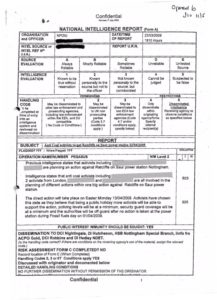
However, the IPCC report gives a different impression: that it is only in March 2009 that Kennedy informs his handlers that he had been invited to take part. The NPOIU DCI (presumably Nightingale, though that is unconfirmed) then decided that Kennedy should participate – and his request is granted the necessary formal authorisation by Ackerley.[5]Ratcliffe-on-Soar Power Station (Operation Aeroscope) Disclosure: Final Report, Independent Police Complaints Commission, March 2012. Seemingly (according to Rose), this particular NPOIU DCI only met Kennedy for the first time on 9 March 2009, though will oversee Kennedy’s deployment for the subsequent period.[6]Sir Christopher Rose, Ratcliffe-on-Soar Power Station Protest: Inquiry into Disclosure, Crown Prosecution Service, December 2011. It is not clear why the IPCC report is seemingly at odds with the picture presented by the disclosure – which has more weight as contemperanous material. It certainly highlights the failings of the IPCC report overall, and in the above aspect seems to have actually misled.
One possible interpretation is that it is only in this month that Nottinghamshire Police, including their Special Branch, are formally told of the activists’ plans, though they clearly knew informally earlier that something was afoot. Another option is that the IPCC either were never provided the NPIOU intelligence material, or did not ask for it. Or perhaps they did get it and ignored it. This material was disclosed in one of the subsequent court cases and at the very least the existance of senstive disclosure being kept by Aeroscope’s intelligence officers was known of and openly referred to in the reports, it is highly improbable that, at the very minimum, the IPCC investigators were not aware of its existence.
The ‘Gold’ level meetings
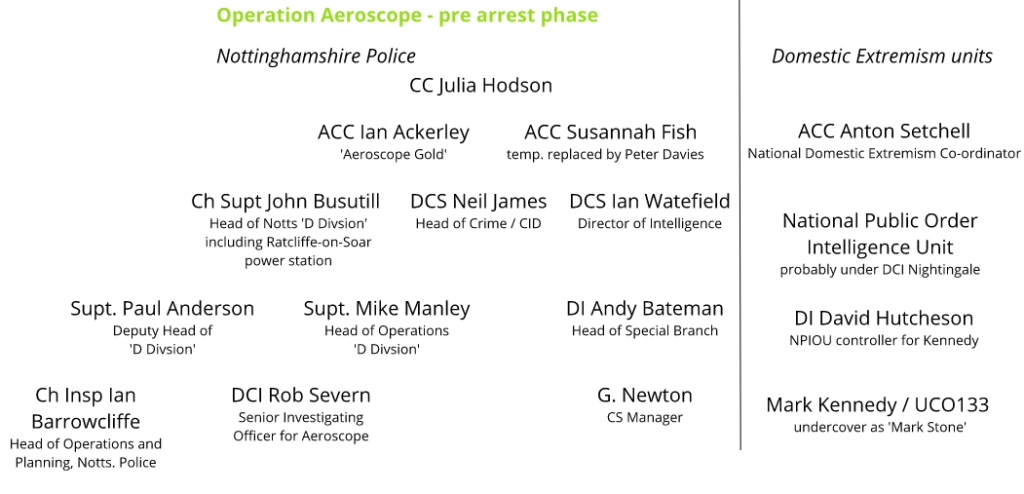 The dissemination of Kennedy’s intelligence triggers two high-level ‘Gold’ command meetings in Nottinghamshire in spring 2009.
The dissemination of Kennedy’s intelligence triggers two high-level ‘Gold’ command meetings in Nottinghamshire in spring 2009.
The first of these is held on 25 March, two days after the Head of Nottinghamshire Special Branch is told. It is a small meeting, attended only by ACC Ackerley, Chief Superintendent John Busuttil and two as yet unnamed detective constables.[7]Response of Nottinghamshire Police to FOIA request made by Merrick Badger, 24 July 2018. Busuttil was an officer in the territorial side of Nottinghamshire Police, being the commanding officer heading up ‘D’ Division, the area to the south of the county which included Ratcliffe-on-Soar power station.
The Gold-Silver-Bronze command structure is a hierarchical technique used by police forces and emergency services for managing situations independent of the absolute rank of the officers involved.[8]Gold-Silver-Bronze Command Structure, Wikipedia, accessed 1 September 2016). It sets out a clear set of principles and responsibilities: Gold holds the strategic overview, Silver works at the tactical level while and Bronze has the operational lead.[9]Authorised Professional Practice: Command and Control: Command Structures, College of Policing, 23 October 2013 (accessed 1 September 2016).
The period of 6 / 7 April is a particularly significant one in the run up to the arrests. It is at this moment in time that Aeroscope is formally established, with Ackerley as Gold Commander,[10]Ratcliffe-on-Soar Power Station (Operation Aeroscope) Disclosure: Final Report, Independent Police Complaints Commission, March 2012. while Busuttil is Silver.[11]Response of Nottinghamshire Police to FOIA request made by Merrick Badger, 24 July 2018. Though, it is clear from the reports that Nottinghamshire police had begun planning and work prior to this formal establishment.
On 7 April, Nottinghamshire Special Branch submit a review of Kennedy’s role in Operation Pegasus. Authored by one G. Newton, it is provided on behalf of the Head of Special Branch for Nottinghamshire, Det. Insp. Andy Bateman. The purpose of the review is:
| …in order to notify the Authorising Officer of recent developments and intelligence obtained by UCO 133 [Mark Kennedy] relating to planned direct action to be taken by activists on the site of Ratcliffe on Soar power station and the participation of UCO 133 during that planned direct action. |
It also noted that for Kennedy to continue collecting ‘pre-emptive intelligence’ he may have to commit minor criminal offences. It was recognised there was a risk of arrest for him, but he was prepared for this and would decline a solicitor if it happened. In relation to this it stated:
| SIO [Senior Investigation Officer] Inspector David Hutcheson [Kennedy’s ‘controller’ within the NPOIU] will be regularly informed of the situation of UCO 133 and in the event of their arrest will be immediately informed in order to liaise with the Nottingham Senior management and the Criminal Prosecution Service. |
In a signed attachment to this review, Ian Ackerley wrote he had seen it and continued to authorise Kennedy’s deployment in relation to the Ratcliffe-on-Soar protest.
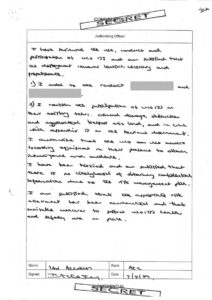
Finally, on the 7 April the second of the Gold level meetings take place. As well as Ackerley and Busuttil, three other senior officers attend:
- Detective Chief Superintendent Ian Waterfield: Nottinghamshire Police’s Director of Intelligence, and Special Branch line manager.
- Superintendent Paul Anderson, Deputy Divisional Commander for D Division
- Chief Inspector Ian Barrowcliffe, Head of Operations and Planning for D Division
It is perhaps of note, that Anderson had joined D Division only relatively recently,[12]Criticism at police charge, Newark Advertiser, 27 March 2009 (accessed 31 August 2018. having been head of ‘Operations North’ in Nottingham city,[13]Police and Constabulary Almanac, 2009, R Hazell & co. the area were Kennedy lived.
The Rose Report notes that at these two meetings no senior investigating officers were present, and ‘On each occasion, the first objective of the Gold strategy was “to protect the source”. ‘[14]Sir Christopher Rose, Ratcliffe-on-Soar Power Station Protest: Inquiry into Disclosure, Crown Prosecution Service, December 2011.
At some point in the pre-arrest phase, Acting Detective Chief Inspector Rob Severn is appointed as the Senior Investigating Officer for the operational side of matters.[15]Ratcliffe-on-Soar Power Station (Operation Aeroscope) Disclosure: Final Report, Independent Police Complaints Commission, March 2012. Severn was another officer from D Division, where he was head of Crime Investigation.[16]Police and Constabularly Almanac, 2009, R Hazell & co.
On the intelligence side of the operation, responsibility for the dissemination of material from Kennedy remained with the NPOIU, including responsibility for disclosing any sensitive evidence to the Crown Prosecution Service if necessary. This was done according to a ‘Local Handling Procedures’ document, which set out the protocols which separated operation and intelligence functions, so that different disclosure officers were to be used.[17]Ratcliffe-on-Soar Power Station (Operation Aeroscope) Disclosure: Final Report, Independent Police Complaints Commission, March 2012.
Weekend of the arrests
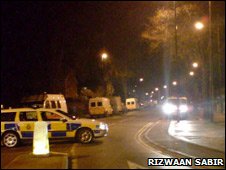
The campaigners gathered at the Iona School in the Nottingham suburb of Sneinton on the weekend of the 10 April 2009. The purpose was to decide whether they would go ahead with the action the following Monday, and to finalise plans if needed. Throughout this time, Kennedy remained heavily involved with planning, including carrying out reconnaissance on behalf of the group. He was among those who argued that the action should proceed despite concerns that police vehicles had been spotted at the power station.[18]Author: conversations with campaigners who were present that night and knew Mark Kennedy.
It is clear from the disclosed intelligence reports, that Nottinghamshire Special Branch were getting live briefings on the night to pass up the chain of command. In particular, an intelligence report, dated 13 April, notes events of the 11 April seemingly in real time:[19]Intelligence reports relating to 2009 planned protest at Ratcliffe-on-Soar power station, National Public Order Intelligence Unit, 2009. Accessed via SpecialBranchFiles.uk. See page 4.
| Intelligence suggests that activists are concerned at the police presence at Power Stations (11/04/2009)
Intelligence Comment |
This refers to an incident where during a reconnaissance a police car had been spotted parked at Ratcliffe-on-Soar by the protestors. This sparked a discussion as to whether their plans had been compromised and should be called off. The discussion was undecided by the time the protestors went to sleep (see elsewhere – one of the basis of the ‘deniers’ case). However, it also triggered a second reconnaissance by Mark Kennedy which found the police car had gone, and Kennedy was among those who subsequently argued the demonstration should go ahead.[20]Author: conversations with campaigners who were present that night and knew Mark Kennedy. The intelligence briefings also mentioned the campaigners having brought to the school where they were meeting equipment such as ‘lock ons’.[21]Intelligence reports relating to 2009 planned protest at Ratcliffe-on-Soar power station, National Public Order Intelligence Unit, 2009. Accessed via SpecialBranchFiles.uk. See page 1.
On the 12 April, Ackerley turned Aeroscope from a ‘reactive public order response’ to a pro-active mass arrest in order to investigate those attending the protest planning meeting for conspiracy. This changed the nature of Aeroscope into a major investigation.
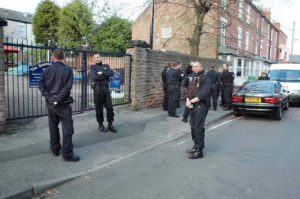
Thus, the same day Ackerley asked one of his deputies, Det. Ch. Supt. Neil James, who was apparently otherwise unaware of Aeroscope, to identify a suitable Senior Investigating Officer for the changing operation to take over from Rob Severn. James put forward Det. Supt. Adrian Pearson, who had only recently arrived at the police force from Warwickshire.[22]Ratcliffe-on-Soar Power Station (Operation Aeroscope) Disclosure: Final Report, Independent Police Complaints Commission, March 2012.
It is not known whether the plan was always to arrest before the protest took place, or whether it was a change based on some operational matter, or had been prompted by intelligence the police were receiving. That Ackerley sought out new officers to take over any subsequent investigation on the day just before the arrests would have taken place is indicative that the arrests were was a change of plan. Press reports from October 2011 noted:[23]Activists plotted to ‘starve’ Ratcliffe power station, BBC News Online, 10 October 2011.
| Nottinghamshire Police said they had “struck early to protect the critical national infrastructure”. |
There would also have been a need to ensure enough officers for what was a sizeable operation were in place, requiring prior planning, especially with them being drafted in from a number of other forces. However, these are likely to have been already on standby, as given that 80-100 protestors were anticipated, police would have wanted to ensure that they had sufficient numbers to handle the protest if it did go ahead.
A number of the senior officers involved in the arrest phase can be identified from press reports. These are Superintendents Mike Manley and and Paul Anderson – like Severn, both served immediately under Busuttil in D Division. Both subsequently commented on the proportionality of the arrests and saying they were intelligence-led. Anderson had been at the second Gold meeting of 7 April. Also involved is likely to have been Chief Inspector Ian Barrowcliffe, long time head of operations and planning for Nottinghamshire Police. However, as noted below, responsibility for investigation and operational matters passed to other officers once the investigation after the arrests began.
At 5am on 13 April, Easter Monday, 200 police raid the Iona School arresting 114 people, including Mark Kennedy. Officers came from not only Nottinghamshire but Derbyshire, Leicestershire and Staffordshire police forces, as well as British Transport Police.[24]Police hold 114 in power protest, BBC News Online, 13 April 2009 (accessed 28 August 2016). Derbyshire and Leicestershire, along with Nottinghamshire, are collectively part of the East Midlands police collaboration, in which various local forces share work on Serious Organised Crime, Major Crime, Intelligence, and Counter Terrorism / Special Branch. It is likely that one particular collaboration, the East Midlands Specialist Operations Unit / East Midland Counter Terrorism Unit, played a role in facilitating Operation Aeroscope given its regional responsibilities on domestic extremism and the use of officers from across the East Midland forces.
Also on 13 April 2009, a number of reports were drawn up by the NPOIU under the subject: ‘Activists planned attack at Ratcliffe-on-Soar Power Station’. These were based on intelligence provided by Kennedy, and marked for verbal dissemination to ‘Silver Commander Nottingham’ (Busuttil) via the Head of Special Branch (Bateman). As discussed previously, though dated 13 April, they are formal accounts of live information received from Kennedy over the previous two days, and the dissemination of this information. As such they are key documents in the disclosure material.[25]Intelligence reports relating to 2009 planned protest at Ratcliffe-on-Soar power station, National Public Order Intelligence Unit, 2009. Accessed via SpecialBranchFiles.uk.
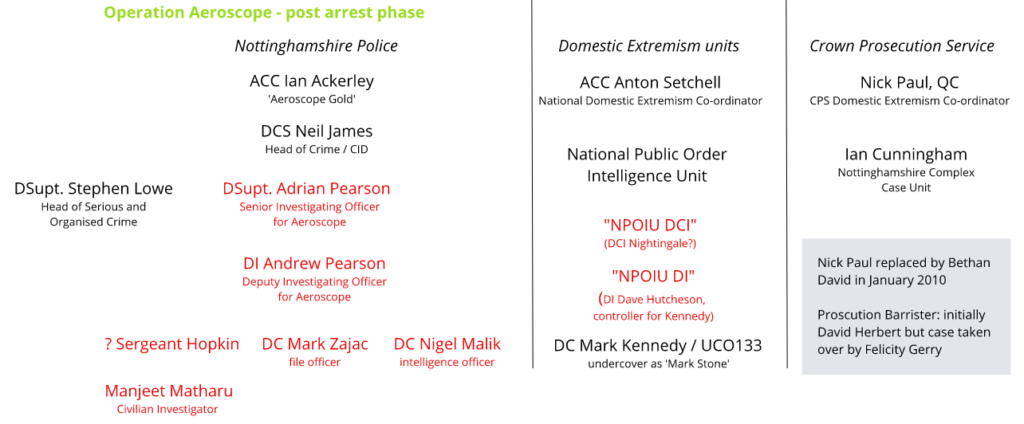
Post-arrest operation
Following the arrests, Adrian Pearson takes over from Severn on 13 April as Senior Investigating Officer (SIO) for Aeroscope. He is told the arrests were ‘intelligence-led’, though at the time he was unaware of the presence of an undercover officer. On 14 April he appoints DI Andrew Roberts as his Deputy SIO, responsible for daily management of the supervision and staff management.[26]Ratcliffe-on-Soar Power Station (Operation Aeroscope) Disclosure: Final Report, Independent Police Complaints Commission, March 2012.
Pearson and Roberts meet with the NPOIU DCI and others from that unit on 16 April and learn that the source of the intelligence leading to the arrests was an undercover officer.[27]Ratcliffe-on-Soar Power Station (Operation Aeroscope) Disclosure: Final Report, Independent Police Complaints Commission, March 2012. However, the precise identity of Kennedy is deliberately not revealed to the investigating officers, the reason for which Rose quotes as:[28]Sir Christopher Rose, Ratcliffe-on-Soar Power Station Protest: Inquiry into Disclosure, Crown Prosecution Service, December 2011.
| “to ensure investigation by SIO was not clouded, to provide source protection and the involvement of UCO [undercover officer] actions did not get preferential treatment”. |
Pearson in turn briefed Detective Chief Superintendent James about there being an undercover police officer involved on the 20th April. It is apparently the first James hears of this. As a result, he directed Pearson set up a meeting between the NPOIU and the CPS Complex Case Unit to ensure they (i.e. James, Pearson and Ian Cunningham of the CPS) are all briefed on the use and conduct of an undercover. James stated that this meeting took place several weeks later and he was satisfied all parties were in no doubt as to the ‘participating involvement of the informant’ and the management and subsequent legal/disclosure issues ‘could be managed appropriately’.[29]Ratcliffe-on-Soar Power Station (Operation Aeroscope) Disclosure: Final Report, Independent Police Complaints Commission, March 2012.
As the investigation developed, a number of officers of junior rank within from Nottinghamshire Police are brought in to fill particular roles. On the 22 April, DC Nigel Malik was appointed Aeroscope’s Intelligence Officer with responsibility for managing sensitive materials, including the gathering and distribution of intelligence. He stated that within two weeks of his appointment, Pearson had informed him there had been an undercover officer involved.[30]Ratcliffe-on-Soar Power Station (Operation Aeroscope) Disclosure: Final Report, Independent Police Complaints Commission, March 2012. It is not clear if he succeeded someone else in this role.
The following day, 23rd April, Manjeet Matharu, a former police officer but now civilian investigator was seconded to Aeroscope as its Disclosure Officer. He states he was not informed of the role of Mark Kennedy at the time, though he subsequently became aware of it.[31]Ratcliffe-on-Soar Power Station (Operation Aeroscope) Disclosure: Final Report, Independent Police Complaints Commission, March 2012.
Over the next couple of months, two officers from the NPOIU, the unnamed DCI sometimes with an unnamed Detective Inspector (presumably Kennedy’s controller, DI David Hutcheson), meet with Aeroscope officers, particularly Pearson, Roberts and Malik. During this time, transcripts of recordings made by Kennedy at the Iona School are handed over to them, as well as two DVD containing intelligence reports and telephone numbers relating to the protestors.
The dates of and officers present at these meetings are detailed in the IPCC and Rose reports, but it suffices to say that subsequent to the arrests Pearson, Roberts, James, Malik and others were all made aware there was an NPOIU undercover active in Nottingham and his intelligence had led to the operation in the first place.[32]Ratcliffe-on-Soar Power Station (Operation Aeroscope) Disclosure: Final Report, Independent Police Complaints Commission, March 2012.
Pearson recalled one particular meeting with the NPOIU on the 7 May, and stated this was when he effectively becomes fully aware of the role of an undercover as the sole source of the intelligence leading to the operation, and that a recording device had been used. He said the NPOIU DCI stated the UCO [Kennedy] would not be giving evidence. This was the first time he learns that Kennedy was among those arrested and bailed in April, and he said he felt he should have been informed of this much earlier.[33]Ratcliffe-on-Soar Power Station (Operation Aeroscope) Disclosure: Final Report, Independent Police Complaints Commission, March 2012.
Regarding this meeting, Pearson had noted he was given by the NPOIU DCI a five and a half page draft witness statement by Kennedy (also described as a ‘de-briefing document’), which he recognised in an contemporary note as having implications for the investigation but needed to remain secret. The same note named DCS James, and a Det. Supt. Stephen Lowe (Head of Serious and Organised Crime for Nottingham, serving under DCS Neil James) as being aware of the document, and that he had told Roberts, Malik and a Det. Sergeant Hopkin (otherwise unknown but presumed part of the Aeroscope investigation team). Pearson at this point also planned to tell Cunningham, but keep the knowledge secret from the rest of the Aeroscope investigation team.[34]Sir Christopher Rose, Ratcliffe-on-Soar Power Station Protest: Inquiry into Disclosure, Crown Prosecution Service, December 2011. Thus, it is clear that by this stage Kennedy’s role (if not his precise identity) was known to the senior officers.
Lowe’s involvement is of interest as a previous head of Nottinghamshire Special Branch when Kennedy first deployed there, and he outside of this meeting he does not appear in any of the material. It is suggested, but not confirmed, that his presence was on the basis of previous experience with NPIOU deployments in Nottingham, including Kennedy.
On 12 May: DC Mark Zajac was appointed to Aeroscope as the File Officer and it was made clear to him that the information leading to the arrests would not be made known to the investigation team and not used as evidence.[35]Ratcliffe-on-Soar Power Station (Operation Aeroscope) Disclosure: Final Report, Independent Police Complaints Commission, March 2012.
Over June 2009, further meetings between the NPOIU DCI & DI took place with Roberts and Malik, all of which raised the presence of a undercover officer and the existence of sensitive material relating to them. At some meetings Matharu and Zajac were also present. One such meeting was a briefing at the CPS in Nottingham on 16 June, led by Cunningham, and included Pearson; Zajac states it is at this meeting that he first learns of Kennedy’s presence as an undercover. Matharu however said he did not learn the full extent of Kennedy’s role as an undercover until September / October 2009. When Malik left the investigation on 12 October, Zajac took over responsibility for some of the material relating to Kennedy; he also received other related materials from DI Roberts at this time.[36]Ratcliffe-on-Soar Power Station (Operation Aeroscope) Disclosure: Final Report, Independent Police Complaints Commission, March 2012.
Inclusion of the Crown Prosecution Service
On the 6 April 2009, Rob Severn contacted Ian Cunningham of the Crown Prosecution Service’s Complex Case Unit Nottingham office to inform him about Aeroscope. Severn tells Cunningham that it is an intelligence-led operation and that Nick Paul, the National Co-ordinator for Domestic Extremism for the CPS’s Special Crime Division, already had an overview of the situation. Paul confirms Cunningham is to be the lawyer on the ground.[37]Ratcliffe-on-Soar Power Station (Operation Aeroscope) Disclosure: Final Report, Independent Police Complaints Commission, March 2012.
Cunningham is said to have been present at subsequent Gold level and ‘pre-incident’ planning meetings prior to the arrests according to police statements. However, Cunningham denies this and states he is not actually briefed by Severn until 12 & 13 April. He also says it is only on 27 April that he attends his first Gold group meeting. Earlier that day he was briefed in a meeting with James, Pearson and Roberts that an undercover had been involved, and was shown the document setting out Kennedy’s tasking.[38]Ratcliffe-on-Soar Power Station (Operation Aeroscope) Disclosure: Final Report, Independent Police Complaints Commission, March 2012. Rose noted that there was ‘a lack of urgency’ in supplying local CPS (namely Cunningham) with specific details about Kennedy, though Cunningham was aware there was an undercover involved.[39]Sir Christopher Rose, Ratcliffe-on-Soar Power Station Protest: Inquiry into Disclosure, Crown Prosecution Service, December 2011.
The meeting of the 27 April is also when Nick Paul was supposedly first informed of Kennedy’s presence and arrest by the NPOIU DCI,[40]Ratcliffe-on-Soar Power Station (Operation Aeroscope) Disclosure: Final Report, Independent Police Complaints Commission, March 2012. though not of the details of his involvement. The use of a Public Interest Immunity application was raised, and in an email to Pearson the same day, Cunningham also noted ‘we will always be vulnerable on disclosure especially matters covert’.[41]Sir Christopher Rose, Ratcliffe-on-Soar Power Station Protest: Inquiry into Disclosure, Crown Prosecution Service, December 2011.
On 15 May, James, Pearson and Roberts meet with Cunningham; at this meeting Pearson gives the CPS lawyer a copy of transcripts of Kennedy’s recording, labelled ‘130409/MARK’. This document can be found in the subsequent disclosure and covers a variety of conversations Mark was part of during the time at the Iona School.
At the meeting Kennedy’s role was discussed at length, but Cunningham felt that the 46 page transcript amounted to nothing more than a ‘health and safety briefing’ – something he and others were subsequently criticised for. It was handed over to the Aeroscope team and securely stored on grounds of being highly sensitive.[42]Ratcliffe-on-Soar Power Station (Operation Aeroscope) Disclosure: Final Report, Independent Police Complaints Commission, March 2012. Given the mostly anodyne nature of the material in the transcript, this sensitivity was likely based more on it revealing the presence of an undercover than its contents.
A 17 June email exchange between Cunningham and Paul discusses Kennedy’s presence and its implications, particularly for those defendants who might run a non-political defence – something that did happen in the second of the related trials, that of the ‘deniers’.[43]Ratcliffe-on-Soar Power Station (Operation Aeroscope) Disclosure: Final Report, Independent Police Complaints Commission, March 2012.
By July 2009, the cases of 67 of those arrested were dropped.[44]
Police end probe of 67 protesters, BBC News Online, 6 July 2009. The remaining 47 are called back to Nottingham that month to be re-interviewed and of these, 20 also have their cases dropped. The final 27, including Kennedy, are re-bailed.[45]Author: emails of 11 April 2016 & 3 April 2018, from Merrick, environmental activist and friend of Mark Kennedy who was involved in exposing him. It is also in July 2009 that Nick Paul apparently rejects a ‘tactical suggestion’ from the NPOIU DCI that Kennedy is not charged and in a subsequent email the NPOIU DCI talks about having to find some way of intervening to prevent Kennedy being formally charged.[46]Sir Christopher Rose, Ratcliffe-on-Soar Power Station Protest: Inquiry into Disclosure, Crown Prosecution Service, December 2011.
On 25 September 2009, Nottinghamshire Police formally start charging 26 of the protestors;[47]Man charged over power station protest, Nottingham Evening Post, 25 September 2009 (accessed via Nexis). the case against Kennedy having been dropped. The same week, Kennedy told his deployment was being ended and he had three weeks to tie things up.[48]Caroline Graham, ‘I’m the victim of smears’: Undercover policeman denies bedding a string of women during his eight years with eco-warriors, Daily Mail, 17 January 2011 (accessed 28 August 2016).
References
| ↑1 | Rob Evans & Paul Lewis, Police knew about plans for Ratcliffe-on-Soar break-in before most activists, The Guardian, 7 June 2011 (accessed 5 July 2017). |
|---|---|
| ↑2, ↑3 | Intelligence reports relating to 2009 planned protest at Ratcliffe-on-Soar power station, National Public Order Intelligence Unit, 2009. Accessed via SpecialBranchFiles.uk. See pages 10 and 11. |
| ↑4 | ’Jaipur’ & ‘Karachi’, The ‘Mosaic Effect’ and the potential risk to officers (redacted), Metropolitan Police Service (Assistant Commissioner’s Public Inquiry Team), 1 Dec 2015, p. 32, accessed via ucpi.org.uk. |
| ↑5, ↑10, ↑15, ↑17, ↑22, ↑26, ↑27, ↑29, ↑30, ↑31, ↑32, ↑33, ↑35, ↑36, ↑37, ↑38, ↑40, ↑42, ↑43 | Ratcliffe-on-Soar Power Station (Operation Aeroscope) Disclosure: Final Report, Independent Police Complaints Commission, March 2012. |
| ↑6, ↑14, ↑28, ↑34, ↑39, ↑41, ↑46 | Sir Christopher Rose, Ratcliffe-on-Soar Power Station Protest: Inquiry into Disclosure, Crown Prosecution Service, December 2011. |
| ↑7, ↑11 | Response of Nottinghamshire Police to FOIA request made by Merrick Badger, 24 July 2018. |
| ↑8 | Gold-Silver-Bronze Command Structure, Wikipedia, accessed 1 September 2016). |
| ↑9 | Authorised Professional Practice: Command and Control: Command Structures, College of Policing, 23 October 2013 (accessed 1 September 2016). |
| ↑12 | Criticism at police charge, Newark Advertiser, 27 March 2009 (accessed 31 August 2018. |
| ↑13 | Police and Constabulary Almanac, 2009, R Hazell & co. |
| ↑16 | Police and Constabularly Almanac, 2009, R Hazell & co. |
| ↑18, ↑20 | Author: conversations with campaigners who were present that night and knew Mark Kennedy. |
| ↑19 | Intelligence reports relating to 2009 planned protest at Ratcliffe-on-Soar power station, National Public Order Intelligence Unit, 2009. Accessed via SpecialBranchFiles.uk. See page 4. |
| ↑21 | Intelligence reports relating to 2009 planned protest at Ratcliffe-on-Soar power station, National Public Order Intelligence Unit, 2009. Accessed via SpecialBranchFiles.uk. See page 1. |
| ↑23 | Activists plotted to ‘starve’ Ratcliffe power station, BBC News Online, 10 October 2011. |
| ↑24 | Police hold 114 in power protest, BBC News Online, 13 April 2009 (accessed 28 August 2016). |
| ↑25 | Intelligence reports relating to 2009 planned protest at Ratcliffe-on-Soar power station, National Public Order Intelligence Unit, 2009. Accessed via SpecialBranchFiles.uk. |
| ↑44 | Police end probe of 67 protesters, BBC News Online, 6 July 2009. |
| ↑45 | Author: emails of 11 April 2016 & 3 April 2018, from Merrick, environmental activist and friend of Mark Kennedy who was involved in exposing him. |
| ↑47 | Man charged over power station protest, Nottingham Evening Post, 25 September 2009 (accessed via Nexis). |
| ↑48 | Caroline Graham, ‘I’m the victim of smears’: Undercover policeman denies bedding a string of women during his eight years with eco-warriors, Daily Mail, 17 January 2011 (accessed 28 August 2016). |